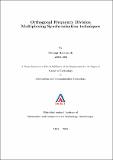Please use this identifier to cite or link to this item:
http://drsr.daiict.ac.in//handle/123456789/203| Title: | Orthogonal frequency division multiplexing synchronization techniques |
| Authors: | Vijaykumar, Chakka Ravikanth, Sivangi |
| Keywords: | Digital modulation Radio frequency modulation Receivers and reception Synchronous data transmision systems Synchronization Data transmision systems Multiplexing Telecommunications Wireless LANs Orthogonalization methods Mobile communication systems |
| Issue Date: | 2008 |
| Publisher: | Dhirubhai Ambani Institute of Information and Communication Technology |
| Citation: | Ravikanth, Sivangi (2008). Orthogonal frequency division multiplexing synchronization techniques. Dhirubhai Ambani Institute of Information and Communication Technology, vii, 55 p. (Acc.No: T00166) |
| Abstract: | Synchronization plays a major role in the design of a digital communication system. Essentially, this function aims at retrieving some reference parameters from the received signal that are necessary for reliable data detection. The OFDM is very sensitive to symbol timing and frequency offset. The loss of orthogonality among the subcarriers causes degradation of the OFDM system performance. so, the timing and frequency offset must be estimated and compensated before demodulating the OFDM signals. This report presents the study of different synchronization schemes for OFDM receiver. Different methods like Schmidl-Cox synchronizer, The Coulson synchronizer, The Minn-Zeng Bhargava synchronizer, Blind carrier offset estimation using unused subcarriers etc. Matlab experiments are conducted to study the performance of different synchronization schemes. The simulations results shows that Blind estimation method is more advantage over training symbol and Cyclic Prefix (CP) based methods in terms of Bandwidth saving. |
| URI: | http://drsr.daiict.ac.in/handle/123456789/203 |
| Appears in Collections: | M Tech Dissertations |
Files in This Item:
| File | Description | Size | Format | |
|---|---|---|---|---|
| 200611030.pdf Restricted Access | 753.5 kB | Adobe PDF |  View/Open Request a copy |
Items in DSpace are protected by copyright, with all rights reserved, unless otherwise indicated.
